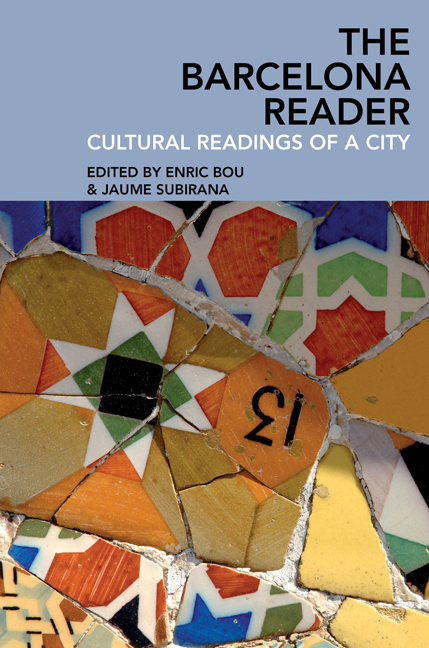Book contents
- Frontmatter
- Contents
- List of illustrations
- Notes on contributors
- Introduction: Barcelona: Cultural readings of a city
- I City, history, and territory
- 1 Barcelona: The siege city
- 2 Barcelona as an adaptive ecology
- 3 A present past, Barcelona street names, from Víctor Balaguer to Pasqual Maragall
- 4 ‘The asylum of modern times’: Barcelona and Europe
- 5 A fragile country
- II City and society
- III Art, architecture, and the city
- IV The Olympics and the city
- V Literature, cinema, and the city
4 - ‘The asylum of modern times’: Barcelona and Europe
from I - City, history, and territory
- Frontmatter
- Contents
- List of illustrations
- Notes on contributors
- Introduction: Barcelona: Cultural readings of a city
- I City, history, and territory
- 1 Barcelona: The siege city
- 2 Barcelona as an adaptive ecology
- 3 A present past, Barcelona street names, from Víctor Balaguer to Pasqual Maragall
- 4 ‘The asylum of modern times’: Barcelona and Europe
- 5 A fragile country
- II City and society
- III Art, architecture, and the city
- IV The Olympics and the city
- V Literature, cinema, and the city
Summary
Veig allà el Pirineu amb ses neus somrosades
i al davant Catalunya tota estesa als seus peus,
i m'en vaig.
[I see the Pyrenees, the gilded peaks of snow,
and all of Catalonia, stretched out at their feet,
And I feel drawn.]
(Joan Maragall, ‘Oda Nova a Barcelona’)
Africa begins at the Pyrenees. (Attributed to Pascal)Europe and Spain
‘You could say that Barcelona does not belong to Spain’, wrote Jaume Balmes, ‘but is more like something imported from Belgium or England’ (972–73). Balmes was an arch-conservative who distrusted northern Liberalism and his remark was not entirely complimentary, but it reflected a perception of Barcelona as a ‘European city’ which almost every citizen would have shared by the mid-nineteenth century, when the remark was made. It remains an almost universal assumption about Barcelona - practically a badge of Barcelonese identity - to the present day. Yet the notion of a ‘European Barcelona’ is a truism redeemed by a mistake: it relies for its force on a presumed distinction between Barcelona and the rest of Spain - or, at least, the rest of Spain, less Catalonia. Barcelona is deemed to be European because Spain is thought of as an extra-European culture. If ‘Africa begins at the Pyrenees’, or if Spain is ‘Europe's Tibet’ - if, in short, in the words of the old tourist-board slogan, ‘Spain is different’ - then Barcelona's assumption of a European identity gives the city a peculiar status and a special role. Events in our own time, however, seem to be exposing the notion of the ‘differentness’ of Spain as a historical myth.
The conviction that Spain does not ‘belong’ to European culture began - though like any similar thesis about another European country it can be justified by reference to earlier texts - in the nineteenth century. It may originally have been a foreign conceit. The cult of the picturesque peddled abroad the vision of romantic engravers, in which Spain was an exotic and archaic land, peopled by swart gypsies inhabiting Moorish ruins. Spanish intellectuals peered with delight into the supposed cultural cleft. For those on the political right a ‘different’ Spain was a vindication of distinctively Spanish virtues, which the materialists and heretics beyond the Pyrenees threatened to pollute.
- Type
- Chapter
- Information
- The Barcelona ReaderCultural Readings of a City, pp. 91 - 130Publisher: Liverpool University PressPrint publication year: 2017

